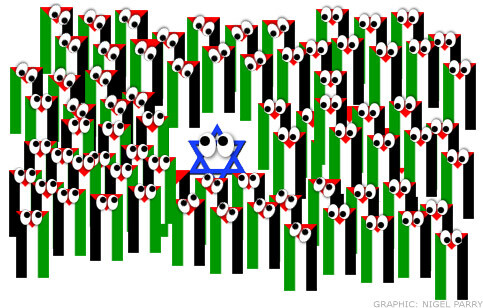Al Jazeera 20 June 2005

Since the collapse of the Oslo accords nearly five years ago, Israeli leaders have been demanding that the Palestinian Authority recognise Israel as a Jewish state in any prospective settlement of the Israeli-Palestinian conflict.
Some Israeli leaders, including Prime Minister Ariel Sharon, have even used the concept of “state of the Jewish people”, with the connotation that Israel belongs not only to its citizens, but to Jews all over the world, including potential future converts. The idea, Israeli academics and intellectuals say, occupies “centre-stage” in Israel’s Zionist collective thinking.
Last year, former Israeli prime minister Benyamin Netanyahu openly called for the adoption of policies aimed specifically at reducing or at least neutralising Arab demographic growth in Israel.
The growing demographic weight of Israeli Arabs, who constitute up to 20% of Israel’s overall population, was more serious and more dangerous for Israel than threats posed by the Palestinians, he said.
Three opinions
But what exactly is meant by “Jewish state” in practical terms, and what are the long-term ramifications for a Palestinian and Arab recognition of Israel as a Jewish state?
This question was put recently to three intellectuals: an Israeli professor, an Arab Knesset member and a Palestinian political scientist. Palestinian advocates argue that given what they consider Israel’s discriminatory policies, the world, let alone the Palestinians and Arabs, are under no more of a legal obligation to maintain Zionism in Israel than it was to maintain apartheid in the Republic of South Africa. The concept of Jewish state (or, for that matter, Christian state) has no origin in international law.
This is the view of Azmi Bishara, an Arab legislator in the Israeli parliament, the Knesset, and an outspoken critic of Israeli treatment of its large Arab minority. Israel, he said, wants the Arabs to recognise Israel’s political legitimacy but also “Zionism’s moral legitimacy”.
Historical score
“Israel is interested in settling a historical score with the Palestinians and the Arabs. They want the Arabs to recognise Zionism and all that it did retroactively,” Bishara told Aljazeera.net. He cited two main reasons for Israel’s insistence that the Palestinians recognise it as a Jewish state:
First, the negation and cancellation of the Palestinian right of return on the ground that Israel is a Jewish state, and since the estimated 4.5 million Palestinian refugees are not Jews, they have no right to return to their hometowns from which they were expelled or forced to flee amid war when Israel was created in 1948.
Second, a formal recognition of the Jewishness of Israel would lend “legitimacy” and “legality” to institutionalised policies and measures aimed at maintaining a Jewish majority.
These policies and measures, Bishara says, include encouraging Israel’s Arab citizens to emigrate, preventing them for intermarrying with Palestinians, and seeing to it that their numbers remain within the “safe zone”.
Asked if Israel would ever contemplate expelling at least some of its non-Jewish citizens in order to maintain an overwhelming Jewish majority, Bishara said Israel would first seek to exhaust all other “non-dramatic means”.
Most Israelis, save probably a few marginal leftist intellectuals such as Illan Pappe of the University of Haifa, don’t see any fault in insisting that their state be recognised as a Jewish state, rather than just merely another “nation state”.
No special status
“We have been a Jewish state since 1948. This is reality. We are also a state for all its citizens, just as Jordan is an Arab state and a state for all its citizens and France is a French state,” argues Ira Sharkansky, a professor of political science at the Hebrew University of Jerusalem.
Sharkansky argues that Israel should not be treated as any other normal nation state because of the Holocaust. “I don’t want to play the Holocaust card, but it is clear that the ‘Jewish state’ is viewed as a sort of guarantee against the recurrence of the Holocaust.”
This is strongly rejected by Bishara, who argues that the “Jewishness” of Israel doesn’t correspond to the “Americanness” of the US or the Frenchness of France. “France, for example, is a state for all its citizens. France doesn’t define itself as a Catholic state or the US as Protestant state. Israel can’t be Jewish and democratic at the same time. The two are oxymoron.”
Palestinian political scientist Atef Odwan, a professor of political science at Gaza’s Islamic University, believes that Israel’s insistence that other nations recognise it as a “Jewish state” is attributable first and foremost to undeclared Israeli designs against its sizeable Arab minority.
“Zionism has two sides - settling Jews in Palestine and uprooting non-Jews from it. Israel’s long-term strategy is to ethnically cleanse and deport its non-Jewish citizens,” he says.
Doomsday scenario
Odwan says: “They don’t say this now because it is politically incorrect and the timing is wrong, but at one point in the future, they will tell the Arabs of Israel ‘we are a Jewish state, you are not Jews, therefore you should leave’.”
Odwan believes racist policies are adopted by successive Israeli governments. “Look at what they are doing to the Palestinians in the West Bank, where every act and every move is calculated to benefit Jews and harm non-Jews.”
Sharkansky strongly rejects this “doomsday scenario”, arguing that while there are indeed Jewish racists, the vast bulk of Israelis won’t allow the occurrence of such a thing.
“Listen, we had Meir Kahane (the American rabbi founder of the extremist Kach group which advocates the collective deportation of Palestinians), and we outlawed his party. I would say Israel deals with its racists much more stringently than the Palestinians deal with their racists.”
Khalid Amayreh is a journalist based in the occupied West Bank. This article was originally published by aljazeera.net on June 17, 2005 and reprinted on EI permission.
Related Links





